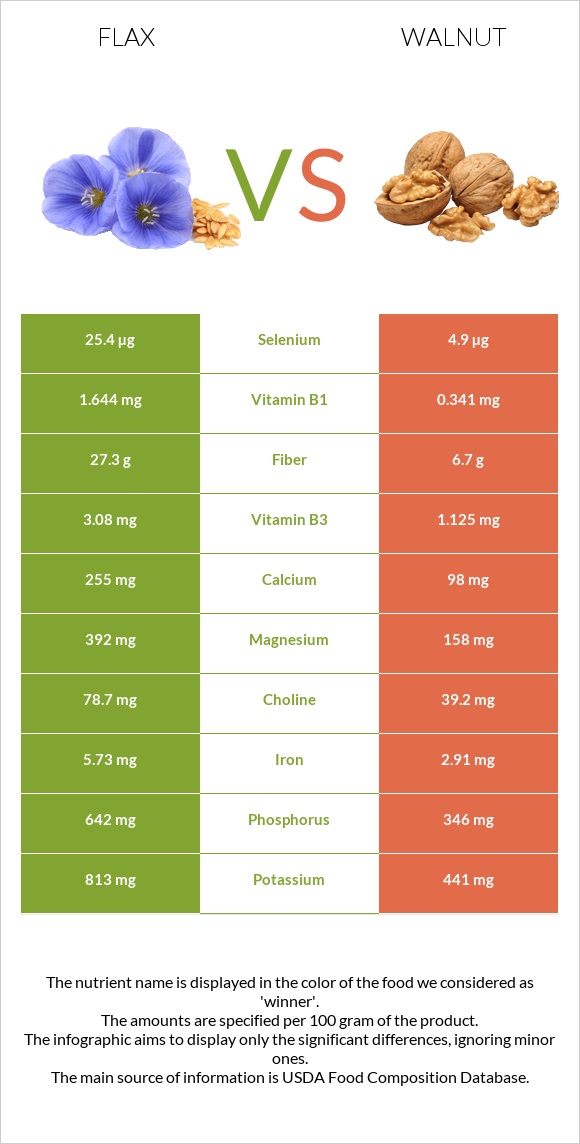Flax seeds vs. Walnut — In-Depth Nutrition Comparison
Compare
A recap on the differences between flax seeds and walnut
- Flax seeds have more vitamin B1, fiber, magnesium, phosphorus, selenium, iron, and calcium; however, walnut is higher in copper and manganese.
- Flax seeds cover your daily vitamin B1 needs 109% more than walnut.
- Walnut contains 5 times less selenium than flax seeds. Flax seeds contain 25.4µg of selenium, while walnut contains 4.9µg.
- Flax seeds have less saturated fat.
Food varieties used in this article are Seeds, flaxseed and Nuts, walnuts, english.
Infographic

Infographic link
Mineral Comparison
Mineral comparison score is based on the number of minerals by which one or the other food is richer. The "coverage" charts below show how much of the daily needs can be covered by 300 grams of the food.
| Contains more MagnesiumMagnesium | +148.1% |
| Contains more CalciumCalcium | +160.2% |
| Contains more PotassiumPotassium | +84.4% |
| Contains more IronIron | +96.9% |
| Contains more ZincZinc | +40.5% |
| Contains more PhosphorusPhosphorus | +85.5% |
| Contains more SeleniumSelenium | +418.4% |
| Contains more CopperCopper | +30% |
| Contains less SodiumSodium | -93.3% |
| Contains more ManganeseManganese | +37.6% |
Vitamin Comparison
Vitamin comparison score is based on the number of vitamins by which one or the other food is richer. The "coverage" charts below show how much of the daily needs can be covered by 300 grams of the food.
| Contains more Vitamin B1Vitamin B1 | +382.1% |
| Contains more Vitamin B3Vitamin B3 | +173.8% |
| Contains more Vitamin B5Vitamin B5 | +72.8% |
| Contains more Vitamin KVitamin K | +59.3% |
| Contains more Vitamin CVitamin C | +116.7% |
| Contains more Vitamin AVitamin A | +∞% |
| Contains more Vitamin EVitamin E | +125.8% |
| Contains more Vitamin B6Vitamin B6 | +13.5% |
| Contains more FolateFolate | +12.6% |
All nutrients comparison - raw data values
| Nutrient |  |
 |
DV% diff. |
| Polyunsaturated fat | 28.73g | 47.174g | 123% |
| Vitamin B1 | 1.644mg | 0.341mg | 109% |
| Fiber | 27.3g | 6.7g | 82% |
| Magnesium | 392mg | 158mg | 56% |
| Phosphorus | 642mg | 346mg | 42% |
| Copper | 1.22mg | 1.586mg | 41% |
| Manganese | 2.482mg | 3.414mg | 41% |
| Selenium | 25.4µg | 4.9µg | 37% |
| Fats | 42.16g | 65.21g | 35% |
| Iron | 5.73mg | 2.91mg | 35% |
| Calcium | 255mg | 98mg | 16% |
| Vitamin B3 | 3.08mg | 1.125mg | 12% |
| Potassium | 813mg | 441mg | 11% |
| Zinc | 4.34mg | 3.09mg | 11% |
| Saturated fat | 3.663g | 6.126g | 11% |
| Vitamin B5 | 0.985mg | 0.57mg | 8% |
| Choline | 78.7mg | 39.2mg | 7% |
| Calories | 534kcal | 654kcal | 6% |
| Protein | 18.29g | 15.23g | 6% |
| Carbs | 28.88g | 13.71g | 5% |
| Vitamin B6 | 0.473mg | 0.537mg | 5% |
| Monounsaturated fat | 7.527g | 8.933g | 4% |
| Vitamin E | 0.31mg | 0.7mg | 3% |
| Folate | 87µg | 98µg | 3% |
| Vitamin C | 0.6mg | 1.3mg | 1% |
| Sodium | 30mg | 2mg | 1% |
| Vitamin B2 | 0.161mg | 0.15mg | 1% |
| Vitamin K | 4.3µg | 2.7µg | 1% |
| Net carbs | 1.58g | 7.01g | N/A |
| Sugar | 1.55g | 2.61g | N/A |
| Starch | 0.06g | 0% | |
| Vitamin A | 0µg | 1µg | 0% |
| Tryptophan | 0.297mg | 0.17mg | 0% |
| Threonine | 0.766mg | 0.596mg | 0% |
| Isoleucine | 0.896mg | 0.625mg | 0% |
| Leucine | 1.235mg | 1.17mg | 0% |
| Lysine | 0.862mg | 0.424mg | 0% |
| Methionine | 0.37mg | 0.236mg | 0% |
| Phenylalanine | 0.957mg | 0.711mg | 0% |
| Valine | 1.072mg | 0.753mg | 0% |
| Histidine | 0.472mg | 0.391mg | 0% |
| Fructose | 0g | 0.09g | 0% |
| Omega-6 - Eicosadienoic acid | 0.007g | 0g | N/A |
Macronutrient Comparison
Macronutrient breakdown side-by-side comparison
Protein:
18.29 g
Fats:
42.16 g
Carbs:
28.88 g
Water:
6.96 g
Other:
3.71 g
Protein:
15.23 g
Fats:
65.21 g
Carbs:
13.71 g
Water:
4.07 g
Other:
1.78 g
| Contains more ProteinProtein | +20.1% |
| Contains more CarbsCarbs | +110.6% |
| Contains more WaterWater | +71% |
| Contains more OtherOther | +108.4% |
| Contains more FatsFats | +54.7% |
Fat Type Comparison
Fat type breakdown side-by-side comparison
Saturated fat:
Sat. Fat
3.663 g
Monounsaturated fat:
Mono. Fat
7.527 g
Polyunsaturated fat:
Poly. Fat
28.73 g
Saturated fat:
Sat. Fat
6.126 g
Monounsaturated fat:
Mono. Fat
8.933 g
Polyunsaturated fat:
Poly. Fat
47.174 g
| Contains less Sat. FatSaturated fat | -40.2% |
| Contains more Mono. FatMonounsaturated fat | +18.7% |
| Contains more Poly. FatPolyunsaturated fat | +64.2% |
Carbohydrate type comparison
Carbohydrate type breakdown side-by-side comparison
Starch:
0 g
Sucrose:
1.15 g
Glucose:
0.4 g
Fructose:
0 g
Lactose:
0 g
Maltose:
0 g
Galactose:
0 g
Starch:
0.06 g
Sucrose:
2.43 g
Glucose:
0.08 g
Fructose:
0.09 g
Lactose:
0 g
Maltose:
0 g
Galactose:
0 g
| Contains more GlucoseGlucose | +400% |
| Contains more StarchStarch | +∞% |
| Contains more SucroseSucrose | +111.3% |
| Contains more FructoseFructose | +∞% |
~equal in
Lactose
~0g
~equal in
Maltose
~0g
~equal in
Galactose
~0g





